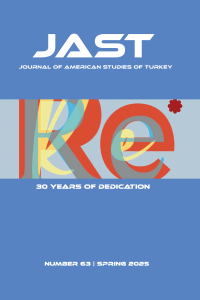Sayı Editör Kurulu





Amaç ve Kapsam
A biannual international publication of the American Studies Association of Turkey, Journal of American Studies of Turkey operates with a double blind peer review system. It publishes transdisciplinary work in English by scholars of any nationality on American literature, history, art, music, film, popular culture, institutions, politics, economics, geography, and related subjects. Contributors need not be members of the American Studies Association of Turkey.
Articles which cross conventional borders between academic disciplines are particularly welcome, as are comparative studies of American and other cultures. The journal also publishes notes, comments, interviews, personal essays and book reviews.
The American Studies Association of Turkey disclaims responsibility for statements, whether of fact or opinion, made by contributors.
The American Studies Association of Turkey was founded in 1988 to promote American Studies in Turkey and support Turkish and non-Turkish scholars working in the field. It also aims to further research and publication in Turkish-American comparative studies.
Journal of American Studies of Turkey is indexed in the MLA International Bibliography, the American Humanities Index, and the ULAKBIM index. It appears in the Ulrich’s International Periodicals Directory and the MLA Directory of Periodicals. It can be accessed online (see the sidebar), in print, and through the EBSCO database.
The ULAKBIM Index can be accessed here: http://cabim.ulakbim.gov.tr/tr-dizin/tr-dizinde-dizinlenen-dergi-listesi/
An international biannual print and on-line publication of the American Studies Association of Turkey, the Journal of American Studies of Turkey operates with a double-blind peer review system and publishes work in English by scholars of any nationality on American literature, history, art, music, film, popular culture, institutions, politics, economics, geography and related subjects. The Editorial Board welcomes articles which cross conventional borders between academic disciplines, as well as comparative studies of America and other cultures. The journal also publishes interviews and and book reviews.
Journal of American Studies of Turkey is indexed in the MLA International Bibliography, the American Humanities Index, and the ULAKBIM index. It appears in the Ulrich’s International Periodicals Directory and the MLA Directory of Periodicals. It can be accessed online (see the sidebar), in print, and through the EBSCO database.
All manuscripts should follow MLA Style and be double-spaced (including notes and Works Cited) in Calibri 11 point font. Articles should be approximately 6,000 to 8,000 words in length. Submissions should be sent as a Word attachment to the e-mail addresses below. No material will be considered for publication if it is currently under consideration by another journal or press or if it has been published, or is soon to be published, elsewhere.
The copyright of all material published will be vested in the Journal of American Studies of Turkeyunless otherwise specifically agreed. This copyright covers exclusive rights of publication of printed or electronic media, including the World Wide Web. Contributors are responsible for obtaining permission to reproduce any material to which they do not own copyright.
Yazım Kuralları
Submission Guidelines:
The Editorial Board welcomes the submission of articles, interviews, and book reviews for publication in JAST. Articles should be approximately 6000-8000 words in length, and book reviews should not exceed 800 words. Articles should be consistent with the objectives and scope of the journal. All accepted submissions are subject to stylistic editing prior to publication.
Article manuscripts should be submitted as 2 separate documents: the first should be a title page with the submission’s title, subtitle (if any), the author’s name, affiliation, full postal address, telephone number, e-mail address, and acknowledgements (if any). The second, the anonymous manuscript, should be arranged in the following order of presentation: title, an abstract (of approximately 150 words), keywords (4 to 6 words), the main body of the text, endnotes (if any), works cited, and appendices (if any). The text should be organized under appropriate subheadings whenever possible.
The most recent MLA manual style should be strictly observed.
Book reviews should include a brief description of the subjects covered in the book; an evaluation of the book’s strength and weaknesses; and the kind(s) of audience(s) to whom the book might appeal. The heading of the review should include: the book’s title, author(s) or editor(s), publication city, publisher, publication date, and number of pages.
Manuscripts should be prepared in Microsoft Word, in Calibri 11-point font, and be double-spaced (including any notes and the works cited).
They can be e-mailed directly to editors Nisa Harika Güzel Köşker (nisahguzel@gmail.com) and Tarik Tansu Yiğit (ttyigit@gmail.com).
In case of technical issues concerning submission, please send a message to the managing director Cem Kılıçarslan (cemkilicarslan@yahoo.com).
JAST - DECLARATION AND COPYRIGHT FORM TO BE SIGNED BY THE AUTHOR(S)
Ethical Conduct in Publication:
1. All submissions should be original and should contribute in a tangible way to their field(s) of study.
2. Authors who borrow from the works and ideas of others must document the source, in accordance with the latest MLA style, even when paraphrasing. All forms of plagiarism are unacceptable and any violation will result in the automatic rejection of the manuscript.
3. Authors are responsible for obtaining the copyrights for any copyrighted material included in their article.
4. No manuscript will be considered for publication if it is currently under consideration by another journal or press, or if it has been published, or is soon to be published, elsewhere. If the manuscript is accepted, the Editorial Board expects that its appearance in JAST will precede publication of the article, or any significant part thereof, in another work.
5. Authors are required to comply with our double-blind peer review process and all referee/editor evaluations.
6. Referees are expected to judge the work of others fully, fairly, and in an unbiased and informed way. A referee who has a conflict of interest or personal/professional issue with the author, topic, or critical stance of a work so as to be unable to judge its merits without prejudice must decline to serve as a reviewer.
7. A referee should discharge his/her tasks in a timely manner and should decline an invitation to review if s/he cannot meet the deadline. Undue delay in submitting a review or a revised manuscript will prompt editorial action ranging from the reassignment of the manuscript to another reviewer to its outright rejection.
8. Referees are expected to maintain confidentiality throughout the entire peer review process.
For more information on ethical standards, please see: https://www.mla.org/Resources/Research/Surveys-Reports-and-Other-Documents/Staffing-Salaries-and-Other-Professional-Issues/Statement-of-Professional-Ethics/Read-the-Statement-Online
Etik İlkeler ve Yayın Politikası
Ethical Guidelines for Authors Publishing in JAST
1-All submissions must be original and contribute in a significant way to their field(s) of study. Manuscripts should provide new insights or interpretations that could further academic understanding.
2-Authors are required to properly attribute the works and ideas of others, in accordance with the latest MLA style (9th edition), even when paraphrasing. All forms of plagiarism, including self-plagiarism (reusing one’s own published work without citation), are unacceptable and any violation will result in the automatic rejection of the manuscript. Please see the submission guidelines.
3-Authors are responsible for securing permissions for any copyrighted material (including images, figures, tables, or lengthy text excerpts) used in their submission. Evidence of permission must be provided before publication. Please see the submission guidelines to download the “Declaration and Copyrights Form.”
4-Manuscripts submitted to JAST must not be under review by another journal or publisher, nor previously published, in whole or in part. If the manuscript is accepted, the Editorial Board expects that its appearance in JAST will precede publication of the article, or any significant part thereof, in another work.
5-Authors must fully comply with JAST’s double-blind peer review process. All feedback provided by reviewers and editors, including suggested revisions, must be addressed in a thorough and timely manner. Authors are encouraged to view the review process as a collaborative effort to enhance the quality and impact of their work.
6-Authors must ensure the integrity of the research presented in their manuscripts. Any fabricated or falsified data will result in rejection.
7-Authors must disclose any potential conflicts of interest that could influence the research or its interpretation, including funding sources, institutional affiliations, or personal relationships.
8-Authorship should be limited to individuals who have made significant intellectual contributions to the research. All co-authors must approve the final manuscript and be accountable for its content. Any changes in authorship (additions, removals, or order changes) must be approved by all co-authors and explained to the Editorial Board.
9-Authors are expected to promptly inform the Editorial Board of any errors discovered in their published work. JAST will issue corrections, retractions, or other amendments as necessary to maintain academic accuracy and integrity.
Ethical Guidelines for the Peer Reviewers
As the Committee on Publication Ethics noted, peer reviewers are integral to maintaining the integrity of the scholarly record. The peer review process relies heavily on the trust and voluntary participation, necessitating responsible behavior from all involved. Journals must provide transparent peer review policies, and reviewers must conduct their reviews ethically and accountably. See, Ethical Guidelines for Peer Reviewers, 2017.
Reviewers are kindly asked to follow the ethical guidelines covering such issues as objective evaluation, conflict of interest, confidentiality, constructive feedback, and timely submissions when reviewing for JAST articles. In this context:
1-Reviewers must consider each manuscript on its merits, irrespective of the topics, regions, or social groups covered. They may disagree with the author’s opinions but should allow them to present their case if supported by evidence.
2-Reviewers must declare any conflicts of interest before agreeing to review a manuscript, including any previous familiarity with the submitted work.
3-Reviewers must keep the peer review process confidential, refraining from sharing information or correspondence about a manuscript with anyone outside the review process. They must not use information obtained during the peer review for personal or others’ advantage or to discredit others.
4-Reviewers should provide a constructive, comprehensive, and evidence-based peer review report, justifying their final decisions. They should make constructive suggestions, seek clarification on unclear points, and ask for further elaboration where necessary. If recommending shortening, reviewers should specify the areas. Artificial intelligence tools to generate a “general” review report with no specific mentions would not be helpful. Reviewers should distinguish between essential additional investigations to support the manuscript’s claims and the ones which will just extend the work.
5-Reviewers must avoid making statements that could be interpreted as questioning anyone’s reputation. Confidential comments to the editor should not include denigration or false accusations, even if the authors will not see these comments.
6-Reviewers should make every effort to submit their report and recommendation on time. If unable to meet the deadline, they should inform the editor. If they cannot review, it is helpful to make suggestions for alternative reviewers if relevant, based on their expertise and without any influence of personal considerations or any intention of the manuscript receiving a specific outcome (either positive or negative).
7-While it is not the reviewer’s job to edit for spelling and grammar, noting specific points where the technical meaning is unclear is helpful. Reviewers should be sensitive to language issues, particularly when authors write in a non-native language, and provide respectful and appropriate feedback.
Steps in the JAST Peer Review Process
The author(s) submits the paper to the journal through DERGİPARK.
In the initial editorial check, the editors first ensure that the manuscript adheres to the journal’s instructions for authors, verifying the inclusion of all required sections and proper formatting and style. JAST utilizes Turnitin to check the originality of manuscripts. Editors then assess whether the paper aligns with the journal’s aims and scope and determine if it is sufficiently original and interesting for the journal’s audience. Papers that do not meet these criteria may be rejected without further review.
If the manuscript fits within the journal’s scope and is deemed original and interesting, invitations along with the abstract are sent to potential reviewers identified as appropriate for the paper. Each manuscript is reviewed by at least two reviewers from different institutions. Upon receiving the invitation, reviewers are responsible for understanding and following the ethical guidelines for peer review. Once the invitation is accepted, the manuscript is sent to the reviewer for assessment.
During the review process, the reviewers allocate time to read the manuscript multiple times to develop a detailed, point-by-point review. The review is then submitted to the journal, including a recommendation to accept or reject the manuscript, or a request for revision. Revisions are classified as major or minor, depending on the extent of work required on the manuscript. Editors consider all returned reviews before making an overall decision. If the reviews are significantly divergent, the editor may invite an additional reviewer to provide another opinion before making a decision.
At the editorial decision stage, the editors communicate the decision to the author(s), which may be to accept, reject, or request revisions. This communication includes the reviewer reports and additional editorial guidance if revisions are requested. If the manuscript is sent back for revision, reviewers should expect to receive a revised version unless they have opted out of further participation. In cases where only minor changes are requested, the follow-up review may be conducted by the editor.
At every stage, it is crucial for the editors, authors and reviewers to adhere to the time allocations specified in the Dergipark system to ensure a smooth production process.
Ücret Politikası
JAST does not charge any publication, document handling or referee services fee from the authors for the papers to be published.
JAST - Journal of American Studies of Turkey


